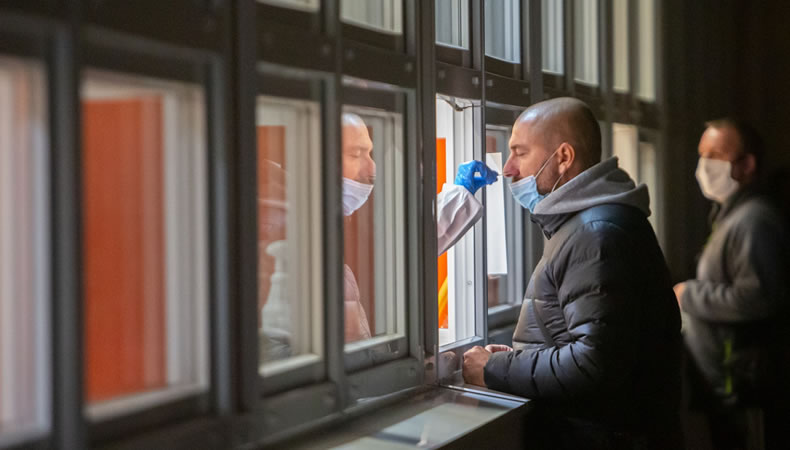Israel: Coronavirus infections have spiked to a new record high since the outbreak of the pandemic


Many Israelis have experienced whiplash as a result of the back-and-forth. The omicron variety is outperforming the government’s ability to formulate and implement clear pandemic public policy, even in the relatively tiny, rich Mideast nation that was an early worldwide leader against the coronavirus pandemic. What was once a simple vaccination, testing, contact tracing, and distancing protocol for the 9.4 million-strong nation has devolved into a zigzag of laws that appear to change every few days.
The omicron variety is outperforming the government’s ability to formulate and implement clear pandemic public policy, even in the relatively tiny, rich Mideast nation that was an early worldwide leader against the coronavirus pandemic. What was once a simple vaccination, testing, contact tracing, and distancing protocol for the 9.4 million-strong nation has devolved into a zigzag of protocols that appear to change every few days.
Related Posts
The ambiguity here, on topics ranging from tourism to testing, quarantines, masks, and school regulation, reflects the pandemic conundrum that governments around the world are grappling with as the omicron form spreads through the population. The World Health Organization will pronounce the pandemic over at some point. In the meantime, authorities are debating how much people are willing to risk in terms of illness, isolation, and death.
The ultra-contagious omicron variant has pushed the fight against COVID-19 into a messier phase of rules governed by a key assumption: large segments of the public will catch the omicron variant, which is more contagious but appears to cause less severe illness and death, especially among vaccinated people, in Israel and elsewhere. Vaccinated persons are also catching the variant leading to a new wave especially during winter festivities.
The new goal is to protect society’s most vulnerable citizens without resorting to another national lockdown. The Prime Minister Naftali Bennett is working hard along with the government to avoid it. “It’s a completely different ballgame,” Bennett said at a press conference on Sunday, warning that the number of daily infections is projected to hit new highs in the coming weeks. “If we want to continue engaging and dealing with an open country as much as possible,” he added, “we must keep our eye on the ball.”
Bennett and the coalition government he leads are struggling to agree on laws and convey their decisions to the public, which has resulted in a tangle of confusion in everyday life. A headline in the Haaretz newspaper on Tuesday read, “Education Ministry Leaves Principals to Deal With COVID-19 Chaos Alone.” According to the piece, a lack of national guidance is leading some school principals to make their own decisions about whether to hold classes in-person, remotely, or hybrid.
At the news conference, Bennett emphasized that the government was being flexible in the face of the more difficult variant. After much debate, the government decided to administer a fourth immunization to the immunocompromised and persons over the age of 60. Israel is said to be the first country in the world to administer a second booster shot to some of its citizens.
Bennett said on Tuesday that a preliminary investigation at Sheba Medical Center found that the fourth jab resulted in a five-fold increase in blood antibodies. Israel is also on the verge of releasing medications that could assist patients in high-risk categories avoid serious infections. The government’s decision to close Israel’s borders in late November, for example, gave time for the country’s vaccination rates to rise in the middle and end of the month. It also enabled hospitals to prepare for a possible outbreak of illness.
The number of people who have been vaccinated has been steadily increasing where approximately 63 percent of people have had two vaccinations, while approximately 46 percent have received three vaccinations. Israel is ranked 17th in the world for immunization rates, only ahead of archrival Iran and behind other wealthy nations like the United Arab Emirates and the United States. Israel was ranked first on the list in June.











